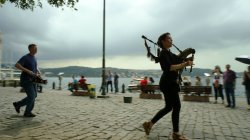One of my favorite films from 2015 was Best of Enemies, Morgan Neville’s documentary about the Buckley/Vidal debates of 1968. That film, which plays like a thriller, explored the contentious relationship between two public figures that exploded in the public eye and gave birth to our age of horrifying, shouting-head, mass-media political punditry. (Next time you’re tempted to watch yet another debate, make the good-citizen move and watch Best of Enemies instead. It’s on Netflix.)
 Silk Road Ensemble
Silk Road EnsembleNeville’s next documentary premiered in Berlin on Monday night. The Music of Strangers: Yo-Yo Ma and the Silk Road Ensemble is like a photo negative of its predecessor.
As you will have gathered from the title, the documentary is about the world’s most famous cellist, Yo-Yo Ma, and his Silk Road Ensemble, which is more of a project than just a group of musicians who perform together. The film tracks the development of the Silk Road Ensemble from the genesis of the idea to their first gathering at Tanglewood in 2000, and through various difficulties they’ve encountered along the way.
It also functions as a mini-introduction to Ma’s life, though he quickly takes a back seat—as it seems he likes to do. Ma is a born convener, a man with insatiable curiosity, and at the start of the film he says that he never really intended to become a musician; it just sort of happened (we see footage of tiny Yo-Yo performing, at age 7, for John and Jackie Kennedy in a TV broadcast). It seems that nonchalance—and relentless success from an early age—has let him develop a broader range of interest and experience than your typical concert musician often can.
 Silk Road Ensemble
Silk Road EnsembleThe most interesting part of the film, though, is the stories of the other musicians—all of whom are among the best in their field, several of whom (Kayhan Kalhor, a kamancheh player from Iran, and Wu Man, a pipa player from China) tell harrowing stories of how cultural revolutions in their countries have thrown unimaginable roadblocks in their way. Cristina Pato, a gaita (bagpipe) player from Galicia, Spain (who, by the way, I saw in the hallway here at the festival earlier today) tells of her own struggles to find her musical voice and figure out why she was making music at all.
That question—why bother? why make art and music when you could be on your feet fighting for your country and your culture?—is asked several times throughout the film in different permutations. The film’s answer is more complex than it appears on the surface. Ma and several other musicians speak of the criticism leveled against the Ensemble, that it represents “cultural tourism,” since it features musicians from distinct musical cultures around the world combining their styles and instruments to make something new.
Interestingly, the film seems to show that the opposite is true—though its greatest weakness as a film is that we never get a sense of the concerns behind that accusation; this is a movie that is fully advocating for the Ensemble’s work. That occasionally leads it down a sentimental path that may put off some viewers. This isn’t an innovative film, overall—the camerawork lyrically mimics the music, but it’s mostly a straight-ahead informative documentary.
 Silk Road Ensemble
Silk Road EnsembleAnd yet it holds your interest. Over and over, the musicians talk about how working with others from around the world has in fact led them back to their own roots, showing them what is unique and worth preserving in their own cultures. For several, it’s prompted them to teach so they can pass on their instrument to another generation. For others, it’s led to new projects, or to helping musicians in their home country.
I read somewhere recently that a true conservative is the person who can spot and cultivate the best of what’s happening in their culture right now. In that way, you could call The Music of Strangers a “conservative” film, or one, at least, that is about conserving culture. And yet it’s also about fostering new culture—so I suppose it takes a progressive stance too.
Near the end, Ma quotes T.S. Eliot’s lines from “Little Gidding” in The Four Quartets:
We shall not cease from exploration
And the end of all our exploring
Will be to arrive where we started
And know the place for the first time.
 Silk Road Ensemble
Silk Road EnsembleThe Music of Strangers makes a strong, important, timely case for exploring the world through friendship, a sort of argument for principled pluralism—relationships built across seemingly unsurmountable barriers in which friends retain their uniqueness without demanding the others yield their own. In this way, The Music of Strangers functions as an artfully-shot companion piece to Best of Enemies, too.
Culture is important because it gives meaning to life, participants say over and over. It is where we are most human. It is where we learn to love one another.
Alissa Wilkinson is Christianity Today’s chief film critic and an assistant professor of English and humanities at The King’s College in New York City. She is co-author, with Robert Joustra, of How to Survive the Apocalypse: Zombies, Cylons, Faith, and Politics at the End of the World (Eerdmans, April 2016). She tweets @alissamarie.













